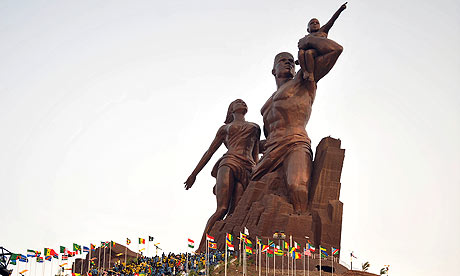Two dramatic
events in a space of three to four days pulled West Africa in two opposite directions,
a classic case of one step forward and two steps back.
Mali wobbling from a surge in internal rebellion by Tuaregs in the north of the country since January succumbed to a disorderly but not wholly unexpected coup d’tat in the early hours of Thursday. Having suffered a chain of heavy losses at the hands of the rebels, the military complained of inadequate equipment and food to defeat the rebels.
Ominously, the Malian Defence Minister’s car was pelted with stones during a visit to an army barracks just outside Bamako before the coup d’tat.
 |
| Senegal's president-elect Macky Sall |
The unrest in Mali is not expected to spread to Senegal especially after the presidential runoff passed off incident-free.
The 85-yr-old
president who suffered the spectacular defeat swiftly conceded defeat even before
the total votes cast were tallied. A victory for Wade would almost certainly
have plunged Senegal into a long period of uncertainty.
Senegal is one of the very few West African countries never to have suffered a military coup in its entire post-independence history.
Senegalese
now have their wishes but it remains to be seen how differently the Macky Sall
administration will govern. Wade’s government became increasingly belligerent,
intolerant, corrupt and even dictatorial during his second term in office.
Sall is a Wade protégé having served under the oldman as prime minister for many years. Besides sharing Wade’s core perspectives on economic management, many of Sall’s key advisors are former colleagues who all served in government under Wade.
Does that mean more of the same? Not really. The pressure for a change in direction away from the Wade legacy runs deep in Senegal. Apart from his intransigence to hang onto power at all cost, Wade’s legacy includes: high unemployment, high levels of graft and nepotism and dreadful delivery of basic public services such as electricity, water and health.
In the 1990s West Africa notoriously carved for itself the unenviable tag of being the most unstable sub-region in Africa with the brutal civil wars in Liberia and Sierra Leone and instabilities in Guinea Bissau and Guinea Conakry.
The latest coup is bad for Mali and its economy which depends essentially on gold and cotton. Mali has risen in recent years to become the third largest exporter of gold in Africa – coming only after South Africa and Ghana. Cost of living is running high and unemployment sky high.
The Sahel region's insecurities (affiliates of Al Qaeda operate in the region), drought and food crises are battering the country hard and this is made worse by the fighting between government forces and Tuareg rebels who are now better armed post-Libya’s revolution that ousted Qaddafi. Some of the Tuaregs fought on the side of the late Libyan dictator.
One thing the coup, the first since 1991, has done is that it has played to the advantage of the rebels and shifted the national army’s attention further away from the conflict zone in the north to stabilizing and consolidating military power in Bamako in the south.
There may be nothing beyond Bamako to hold on to by the time the soldiers complete consolidating their grip on the capital city. Mali was scheduled to hold presidential elections on April 29. That's up in the air for now at least.
That the coup is a setback for democracy in the region is an understatement. Ironically, the Malian soldiers staged the coup while the African Union peace and security council was meeting in Bamako to find solutions to growing insecurity in the Sahel, a region with very harsh terrain and straddling between North Africa and West Africa.
A question
worth asking though is whether the instabilities will stop with Mali? Has Mali
triggered another spring revolution akin to the Arab spring? Countries such as Burkina Faso, Chad, Niger
and Mauritania are all in grave danger with the proliferation of both small and
heavy weapons flowing from the Arab spring and the mix of drought and food crises, large unemployed and disaffected
population, weak governments and state institutions.
Anyways, thumps up for Senegal. Thumps down for Mali.

















